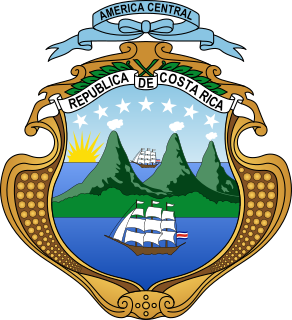Municipal and local elections were held for the first time in Costa Rica on 1 December 2002. This was the first time citizens of the 81 cantons were able to directly choose their mayors as previously the municipal executive was appointed by the city council. [1] A syndic and 4 District Councilors were also elected for each canton’s district as 8 intendants for especial districts with administrative autonomy.

Costa Rica is administratively divided into seven provinces which are subdivided into 82 cantons, and these are further subdivided into districts. Cantons are the only administrative division in Costa Rica that possess local government in the form of municipalities. Each municipality has its own mayor and several representatives, all of them chosen via municipal elections every four years.

Syndic is a term applied in certain countries to an officer of government with varying powers, and secondly to a representative or delegate of a university, institution or other corporation, entrusted with special functions or powers.
Contents
Then ruling Social Christian Unity Party had its best results in history on a local election gaining most of the mayors and councilors; 48 mayors and 785 syndics and councilors. [1] National Liberation Party, then main opposition force, earn the second largest number of both with 27 mayors and 676. [1] Costa Rica was still pretty much under a two-party system at the time even when in the recent general election the new force Citizens Action Party surprised with high voting for president and parliament, in this first municipal running achieve only one mayor in Montes de Oca (the party’s hometown). [1]

The Social Christian Unity Party is a centre-right political party in Costa Rica.

The National Liberation Party, nicknamed the verdiblancos, is a political party in Costa Rica. The party is a member of the Socialist International.
A two-party system is a party system where two major political parties dominate the government. One of the two parties typically holds a majority in the legislature and is usually referred to as the majority or governing party while the other is the minority or opposition party. Around the world, the term has different senses. For example, in the United States, Jamaica, and Malta, the sense of two-party system describes an arrangement in which all or nearly all elected officials belong to one of the only two major parties, and third parties rarely win any seats in the legislature. In such arrangements, two-party systems are thought to result from various factors like winner-takes-all election rules. In such systems, while chances for third-party candidates winning election to major national office are remote, it is possible for groups within the larger parties, or in opposition to one or both of them, to exert influence on the two major parties. In contrast, in the United Kingdom and Australia and in other parliamentary systems and elsewhere, the term two-party system is sometimes used to indicate an arrangement in which two major parties dominate elections but in which there are viable third parties which do win seats in the legislature, and in which the two major parties exert proportionately greater influence than their percentage of votes would suggest.





